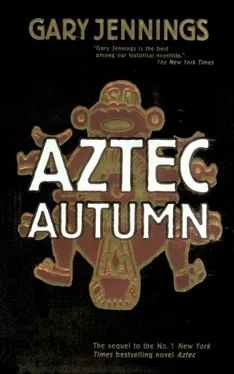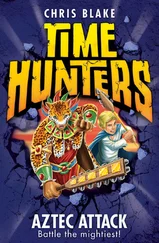Gary Jennings - Aztec Autumn
Здесь есть возможность читать онлайн «Gary Jennings - Aztec Autumn» весь текст электронной книги совершенно бесплатно (целиком полную версию без сокращений). В некоторых случаях можно слушать аудио, скачать через торрент в формате fb2 и присутствует краткое содержание. Жанр: Старинная литература, на английском языке. Описание произведения, (предисловие) а так же отзывы посетителей доступны на портале библиотеки ЛибКат.
- Название:Aztec Autumn
- Автор:
- Жанр:
- Год:неизвестен
- ISBN:нет данных
- Рейтинг книги:4 / 5. Голосов: 1
-
Избранное:Добавить в избранное
- Отзывы:
-
Ваша оценка:
- 80
- 1
- 2
- 3
- 4
- 5
Aztec Autumn: краткое содержание, описание и аннотация
Предлагаем к чтению аннотацию, описание, краткое содержание или предисловие (зависит от того, что написал сам автор книги «Aztec Autumn»). Если вы не нашли необходимую информацию о книге — напишите в комментариях, мы постараемся отыскать её.
Readers familiar with Mexican history will welcome the rich details of this vengeance drama; those new to it will be impressed by Jennings's exhaustive research.
Aztec Autumn — читать онлайн бесплатно полную книгу (весь текст) целиком
Ниже представлен текст книги, разбитый по страницам. Система сохранения места последней прочитанной страницы, позволяет с удобством читать онлайн бесплатно книгу «Aztec Autumn», без необходимости каждый раз заново искать на чём Вы остановились. Поставьте закладку, и сможете в любой момент перейти на страницу, на которой закончили чтение.
Интервал:
Закладка:
I called for Nochéztli and repeated the report. "Prepare our forces. We will march two days from now. This time I want everyone to participate, including—we will doubtless have need of them—all our tíciltin, Swaddlers and Swallowers. This will be the most ambitious, audacious assault of all we have yet made, hence perfect practice for our eventual assault on the City of Mexíco."
Fortuitously, the very next day, Pozonáli and Verónica returned to us, safely and together, and, though much fatigued from their long, hard ride, came immediately to report to me. So excited were they that they began speaking simultaneously in their separate languages of Náhuatl and Spanish.
"The goldsmith thanks you for your warning, Tenamáxtzin, and sends you his warm regards in return..."
"You are already famous in the City of Mexíco, my lord. I should say famous and feared..."
"Wait, wait," I said, laughing. "Verónica first."
"What I bring is the good news, my lord. To begin with, I did deliver your message to the Cathedral and, as you supposed, when your friend Alonso received it, whole troops of soldiers began combing the city to find the messenger who had brought it. But they could not, of course, I being indistinguishable from so many other girls like myself. And, as you commanded, I listened to many conversations. The Spaniards, by what means I do not know, are already aware that our whole army is encamped here in the Mixtóapan. So they are calling our insurrection 'the Mixton War,' and—I rejoice to report—it has much of New Spain in a panic. Whole families from the City of Mexíco and from everywhere else are crowding into the seaports—Vera Cruz and Tampico and Campeche and every other—demanding passages back to Old Spain, on any kind of vessel sailing there—galleons, caravels, victualler ships, anything. Many are saying fearfully that this is the re- conquest of The One World. It appears, my lord, that you are achieving your aim of chasing the interlopers—at least the white ones—entirely out of our lands."
"But not all of them," said Iyac Pozonáli, frowning. "Despite Coronado's having taken so many of New Spain's soldiers on his northward expedition, the Viceroy Mendoza has still a considerable force in the City of Mexíco, some hundreds of mounted and foot soldiers, and Mendoza has taken personal command of them. Furthermore, as you expected, Tenamáxtzin, many of his tame Mexíca have enlisted to fight alongside him. So have many of these other treacherous peoples—the Totonáca, the Tezcaltéca, the Acólhua—who long ago aided the Conquistador Cortés in his overthrow of Motecuzóma. For the first time ever, Mendoza is allowing those indios to ride horses and carry thunder-sticks, and he is right now busily engaged in the training of them."
"Our own people," I said sadly, "arrayed against us."
"The city will maintain a sufficient defensive force," Pozonáli went on. "Thunder-tubes and such. But I would reckon, from what I learned, that the Viceroy Mendoza plans an offensive march to rout us out of here and destroy us before we ever get near the City of Mexíco."
"Well, good luck to Mendoza," I said offhandedly. "However many his men, however well armed, they will be annihilated before they ever get to us here. I have experimented, and the Knight Pixqui was right when he said that these mountains are impregnable. In the meantime, I will be giving the viceroy further evidence of our might and our determination. Tomorrow we march east—every warrior, every horseman, every arcabuz man, every Purémpe granada-thrower, every last one of us who can wield a weapon. We are marching against a city called Hot Springs, and after we have taken that, the Viceroy Mendoza may decide to try to hide the City of Mexíco. Now, you two go and get some food and rest. I know you, Iyac, will want to be in the thick of the fight. And I shall want you near me, Verónica, to do the chronicling of this most epic of all our battles so far."
XXXII
Of the final battle of the "Mixton War"—of our defeat and the end of the Mixton War—I will speak only briefly, because it happened through my own grievous fault, and I am ashamed of that. Again, as I had done with other enemies, and even with some of the women in my life, I underestimated the cunning of my opponent. And I am paying for my mistake by lying here slowly dying—or slowly healing, I know not which, and do not much care.
My army could still be here in the Miztóapan, entire and secure and healthy and strong and ready to do battle again, had I not taken them out of this valley. Just as we had earlier baited the Spanish trading post's soldiers into ambush here, so we were baited out of our safe haven. It was the doing of the Viceroy Mendoza. He, knowing that we were invincible in these mountains, almost untouchable, contrived to lure us out of them by, in a sense, offering us Aguascalientes. I do not blame my scouts who found that town—they are dead now, like so many others—but I have no doubt that the Spanish horseman they followed to that town was playing a part in Mendoza's plan.
I took my whole army, leaving in the valley only the slaves and those males too old or too young to do battle. It was a three-day march to Hot Springs, and even before we got within sight of it, I began to suspect that something was not quite right. There were army outpost shacks, but no soldiers in them. When we approached the town, no thunder-tubes boomed out at us. When I sent my forward scouts sneaking warily into the town itself, there was no rattle of arcabuces, and the scouts came out, shrugging in puzzlement, to report that there seemed to be not a single person in the town.
It was a trap. I turned in my saddle to shout "Retreat!" But it was already too late. Arcabuces now did rattle, and from all around us. We were surrounded by Mendoza's soldiers and their indio allies.
Oh, we fought back, of course. The battle went on daylong, and many hundreds died on both sides. Death, that day, was a glutton. As I have remarked, any battle is a commotion and a confusion, and some of the dyings were done in curious ways. My knights Nochéztli and Pixqui both were pierced by balls discharged by our own arcabuz men, too recklessly employing their weapons. On the other side, Pedro de Alvarado—one of the first conquistadores in The One World, and the only one still being an active conquistador—died when he fell from his horse and the horse of another Spaniard trampled him.
Since both our armies, mine and Mendoza's, were fairly equal in numbers and armament, it should have been a pitched battle, the victory going to the bravest and strongest and most clever. But what lost it for us was this. My men courageously engaged every white soldier they encountered, but too many of them (bar the Yaki) could not bring themselves to slaughter the men of their own race—the Mexíca and Texcaltéca and others—who were fighting on Mendoza's side. To the contrary, those traitors of our own race, naturally seeking to curry favor with their Spanish masters, hesitated not at all to slaughter us. I myself took an arrow in my right side, and that surely came from no Spaniard. For all I know, it came from some unknown relative of mine.
One of our battlefield tíciltin jerked the arrow out of me—painful enough, that—then daubed the open wound with the corrosive xocóyatl—so much more painful that I actually and unmanfully screeched aloud. The tícitl could do no more for me, because next instant he fell dead of an arcabuz ball.
When finally night came down, our armies disengaged—what was left of them—and the ragged remnant of ours, those who had horses, hastily withdrew to the westward. Pozonáli, one of the few survivors whom I knew by name, found Verónica on the hilltop whence she had watched the carnage, and brought her along as we made haste to get back to our mountain sanctuary. I could barely sit my saddle, so agonizing was the pain in my side, thus I was in no condition to worry about whether we were being pursued through the night.
Читать дальшеИнтервал:
Закладка:
Похожие книги на «Aztec Autumn»
Представляем Вашему вниманию похожие книги на «Aztec Autumn» списком для выбора. Мы отобрали схожую по названию и смыслу литературу в надежде предоставить читателям больше вариантов отыскать новые, интересные, ещё непрочитанные произведения.
Обсуждение, отзывы о книге «Aztec Autumn» и просто собственные мнения читателей. Оставьте ваши комментарии, напишите, что Вы думаете о произведении, его смысле или главных героях. Укажите что конкретно понравилось, а что нет, и почему Вы так считаете.











